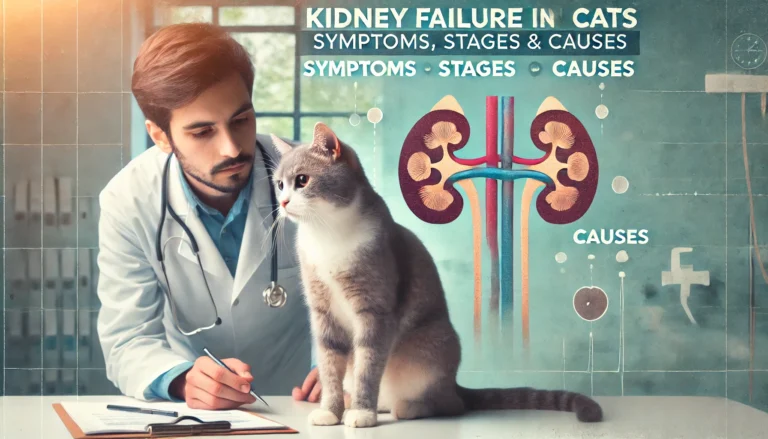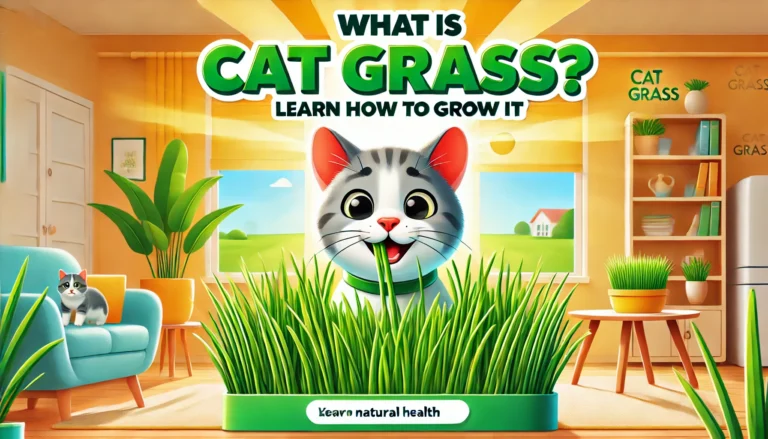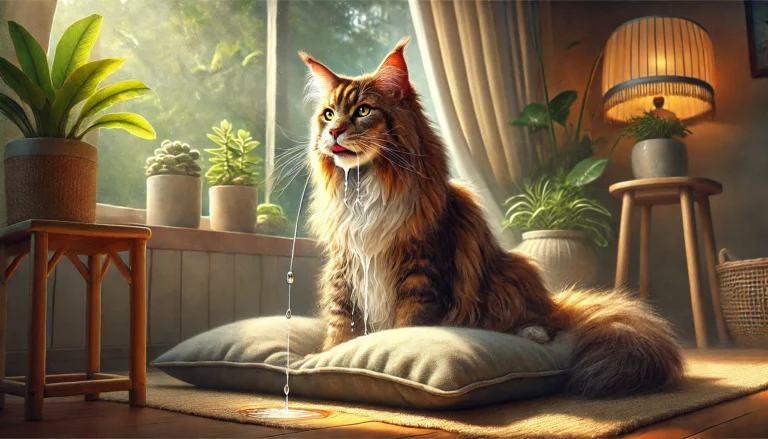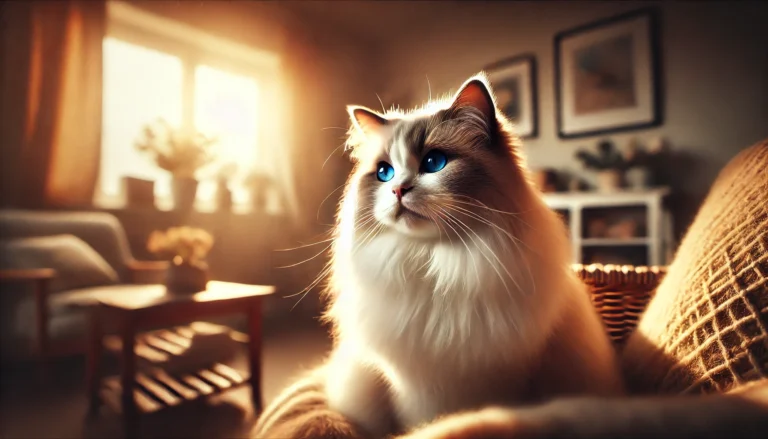Can Cats Eat Pumpkin? 7 Surprising Benefits & Dangers Every Cat Owner Must Know
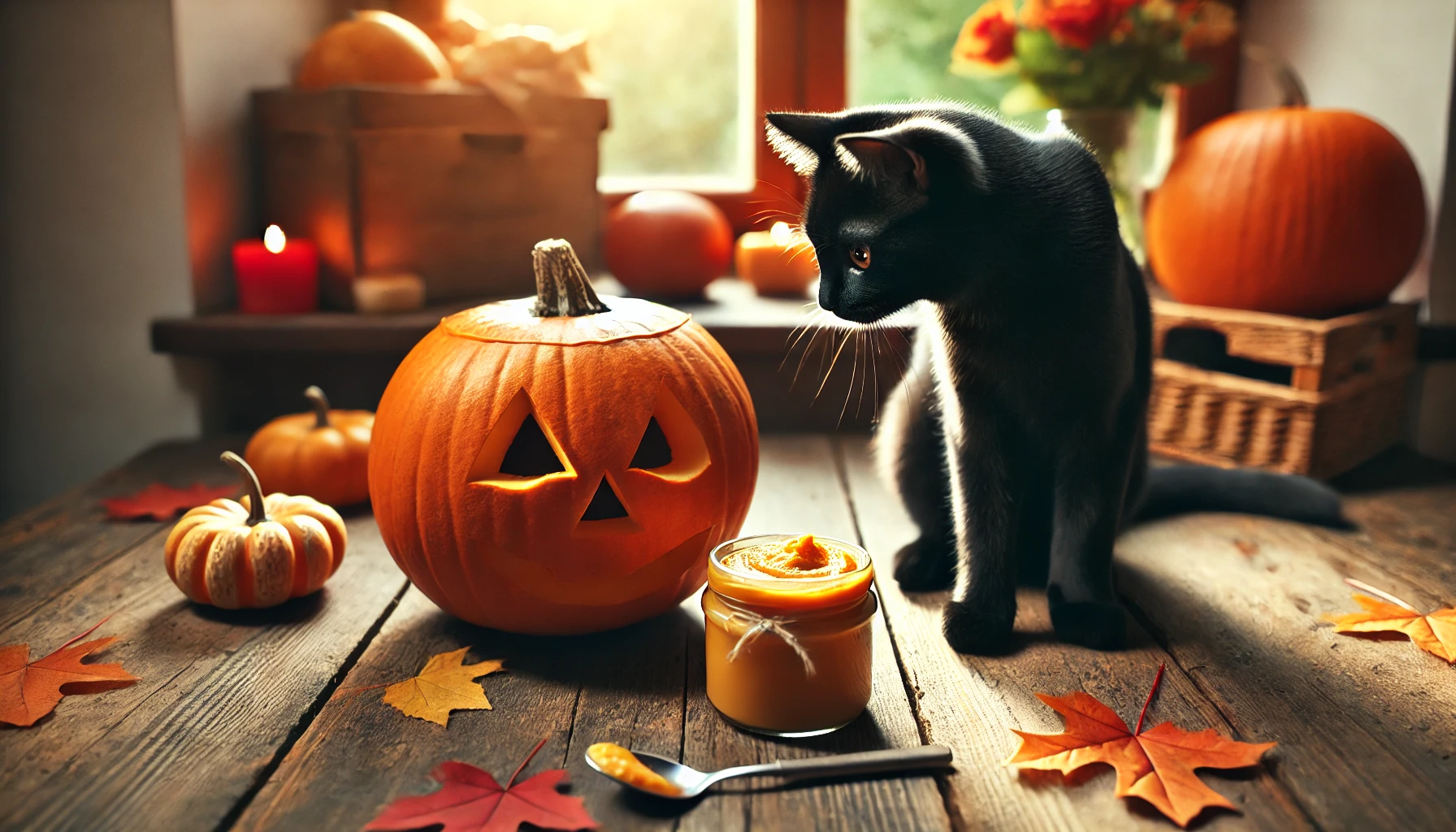
Cat owners often wonder, can cats eat pumpkin? The answer is yes, but there are a few things to keep in mind. Pumpkin can provide surprising health benefits for your feline friend, but it’s important to serve it the right way to avoid potential risks.
Pumpkin has become a popular home remedy for digestive problems, like constipation and diarrhea, in cats. It is also rich in nutrients that support a healthy digestive system. However, not all pumpkin products are safe—feeding the wrong type or amount could lead to issues.
In this article, we’ll cover everything you need to know about pumpkin for cats—from its benefits to how much to give your pet, and even which forms to avoid. Let’s explore if pumpkin is a healthy treat or if it could pose a danger to your furry companion.
Is Pumpkin Safe for Cats?
Yes, pumpkin is safe for cats, but only in moderation. In fact, many veterinarians recommend pumpkin as a natural way to treat digestive issues. Both adult cats and kittens can benefit from pumpkin, but it’s important to know which types are safe and which are not.
Can Cats Eat Pumpkin?
Cats can eat plain, cooked pumpkin without any additives. Canned pumpkin is often recommended since it’s easy to serve and store. However, avoid pumpkin pie filling, which contains sugar, spices, and other ingredients that could upset your cat’s stomach.
Are Pumpkins Toxic to Cats?
Pumpkins are not toxic to cats. However, eating too much can cause digestive discomfort, such as diarrhea or stomach upset. If your cat eats raw pumpkin or pumpkin rind, it may lead to vomiting or blockage, as these parts are harder to digest.
Can Kittens Eat Pumpkin?
Yes, kittens can eat pumpkin, but only in small amounts. Start with tiny portions and observe how their bodies react. Their digestive systems are more sensitive, so be cautious when introducing any new food.
Health Benefits of Pumpkin for Cats
Pumpkin offers several health benefits for cats, making it a popular remedy among pet owners. Let’s explore why pumpkin is good for cats and how it can improve their well-being.
1. Pumpkin for Cat Constipation
Pumpkin is rich in dietary fiber, which helps move things along in the digestive tract. If your cat struggles with constipation, adding a small amount of pumpkin puree can help soften the stool and relieve discomfort. Many pet owners use pumpkin for cat constipation as a natural remedy.
2. Pumpkin for Cats with Diarrhea
Surprisingly, pumpkin works both ways. While it helps with constipation, it can also firm up loose stools. Its soluble fiber absorbs water in the intestines, making pumpkin for diarrhea in cats a great solution. However, only a small amount is needed to avoid worsening diarrhea.
3. Helps with Weight Control
Pumpkin is low in calories and high in fiber, helping cats feel fuller without overeating. If your cat is on a diet or prone to weight gain, feeding pumpkin to cats can help control their appetite while keeping them satisfied.
4. Natural Remedy for Vomiting and IBS in Cats
Pumpkin’s soothing properties can help cats with vomiting caused by an upset stomach. Additionally, some pet owners use pumpkin for IBS (Irritable Bowel Syndrome) to reduce flare-ups. While it’s not a cure, pumpkin can complement other treatments for these issues.
5. Supports a Healthy Coat and Skin
Pumpkin contains essential vitamins and antioxidants, such as Vitamin A, which promotes a healthy coat and skin. A small dose of pumpkin in your cat’s diet can improve their overall appearance and help reduce skin irritations.
How to Feed Pumpkin to Your Cat Safely
Introducing pumpkin to your cat’s diet requires careful planning to ensure it benefits their health. Let’s look at the best ways to serve pumpkin to cats and how much is safe for them.
How Much Pumpkin to Give a Cat
A teaspoon of pumpkin puree is usually enough for most cats. If you’re using pumpkin for cat constipation or diarrhea, start with a small amount (½ to 1 teaspoon) once a day and monitor your cat’s stool. If needed, you can increase it to twice a day.
Is Canned Pumpkin Good for Cats?
Yes, canned pumpkin is a convenient and safe option, as long as it’s plain pumpkin with no added sugars or spices. Avoid canned pumpkin labeled as “pumpkin pie filling” because it may contain nutmeg or sweeteners, which can be harmful to cats.
Can Cats Eat Pumpkin Puree?
Absolutely! Pure pumpkin puree is the easiest way to introduce pumpkin into your cat’s diet. You can mix it with their regular food or serve it alone. Just ensure it’s free from any additives.
How to Give Pumpkin to Cats
- Mix it with wet food – Add a small amount to your cat’s meal.
- Serve it as a treat – Offer a teaspoon of pumpkin on a plate for cats that enjoy the taste.
- Use it as a supplement – Incorporate pumpkin during digestive upsets or as part of their weight management plan.
Can Kittens Have Pumpkin Puree?
Yes, but introduce pumpkin to kittens slowly. Their small bodies are sensitive, so stick to very small portions and check for any adverse reactions.
Did you Know?
When it comes to feeding your feline friend, choosing the best cat food is crucial for their health and well-being.
Pumpkin Seeds and Other Forms: Are They Safe for Cats?
While pumpkin flesh is beneficial, many cat owners wonder whether other parts, such as pumpkin seeds, are safe for their pets. Let’s explore the options.
Can Cats Eat Pumpkin Seeds?
Yes, pumpkin seeds are safe for cats if prepared properly. They are rich in healthy fats and antioxidants, which can support urinary health. However, they must be:
- Plain and unsalted – Avoid any seasoning, salt, or spices.
- Roasted or boiled – Raw seeds can be difficult to digest.
Pumpkin Seeds for Cats: Are They Beneficial?
Pumpkin seeds contain compounds that may help prevent parasites such as intestinal worms. However, they should only be given occasionally and in moderation. A small, crushed seed or two is enough for most cats.
Can Cats Eat Pumpkin Pie or Squash?
- Pumpkin pie is not safe for cats. It contains sugar, spices (like nutmeg), and other ingredients that can harm your cat’s health.
- Squash is a safer alternative. Some cats enjoy cooked squash varieties like butternut or acorn, as these offer similar fiber and vitamins.
Can Cats Have Pumpkin Puree from Different Brands?
Always check labels to ensure the puree is 100% pumpkin. Some store-bought purees might have added flavors or preservatives.
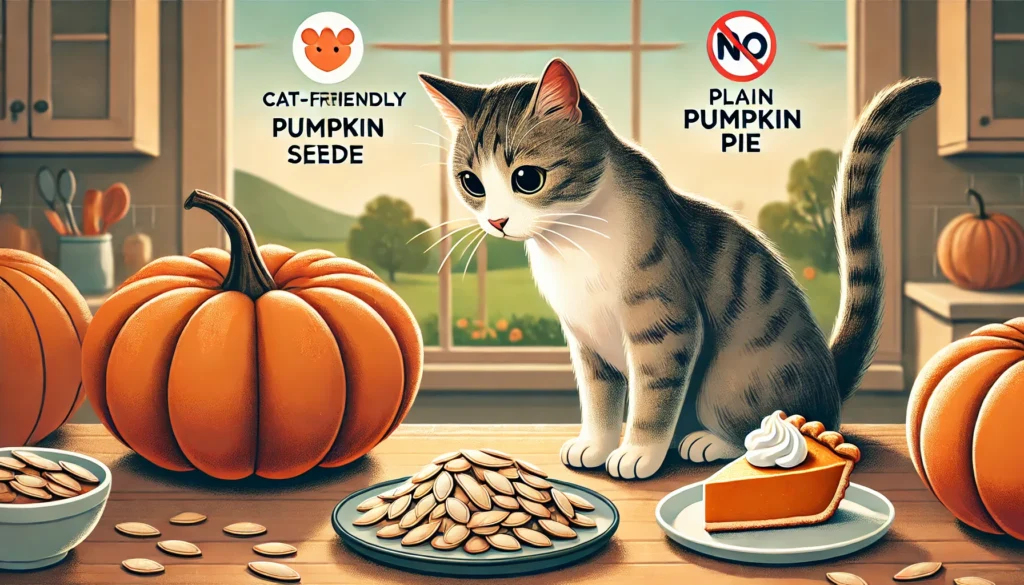
Potential Risks and Warnings When Feeding Pumpkin to Cats
Although pumpkin for cats has many benefits, it’s important to be aware of potential risks. Feeding pumpkin the wrong way or in excessive amounts can lead to issues.
Is Pumpkin Bad for Cats?
Pumpkin is generally safe, but too much pumpkin can upset your cat’s stomach, leading to diarrhea. Additionally, some cats may be allergic to pumpkin, causing vomiting, lethargy, or itching.
Are Pumpkins Toxic to Cats?
While pumpkin itself is not toxic, certain parts like the stem, raw pumpkin skin, or rinds can cause digestive blockages if eaten. Always remove these parts before feeding your cat.
Can Cats Eat Pumpkin Pie?
No, pumpkin pie is not safe for cats. Ingredients like sugar, cinnamon, and nutmeg can cause stomach issues and may even be toxic. Avoid giving your pet any baked pumpkin products.
Are Pumpkins Dangerous for Kittens?
Kittens can have pumpkin in small amounts, but their sensitive digestive systems make them more prone to side effects. Monitor them closely after feeding and reduce the portion size if they show signs of discomfort.
How to Know If Pumpkin Isn’t Working for Your Cat
If your cat experiences vomiting, diarrhea, or lack of appetite after eating pumpkin, discontinue it immediately. Persistent symptoms may indicate a bigger health issue that requires a visit to the vet.
Conclusion: Can Cats Eat Pumpkin Safely?
So, can cats eat pumpkin? Yes! Pumpkin is a safe and healthy addition to your cat’s diet when given in the right amount. It can help with constipation, diarrhea, weight control, and vomiting, making it a popular home remedy for pet owners. Canned pumpkin and pumpkin puree are convenient options, but avoid pumpkin pie or any flavored varieties that could harm your pet.
Always start with small portions—around 1 teaspoon—to see how your cat responds. If you notice any side effects like vomiting or diarrhea, stop feeding it and consult your vet. Pumpkin seeds can also be a nutritious snack if served plain and roasted. However, make sure to monitor your cat for any unusual reactions, especially if it’s their first time eating pumpkin.
With proper care, pumpkin can support your cat’s health and provide relief from digestive problems naturally.
FAQs about Pumpkin for Cats
1. How much pumpkin should I give my cat for constipation?
Start with ½ to 1 teaspoon of pumpkin puree mixed into their food once a day. Increase to twice daily if needed, but consult your vet if constipation persists.
2. Can cats eat pumpkin every day?
Yes, but only in small amounts. Daily feeding is safe as long as it doesn’t exceed 1 teaspoon per serving. Monitor for any signs of digestive upset.
3. Does pumpkin help with diarrhea in cats?
Yes, pumpkin’s soluble fiber helps firm up loose stools. Use a small amount, and only continue if diarrhea improves within a day or two.
4. Can cats have pumpkin seeds?
Yes, but only plain, roasted seeds in small quantities. Avoid salted or spiced seeds, which can be harmful.
5. Is canned pumpkin or fresh pumpkin better for cats?
Both are good, but plain canned pumpkin is more convenient. Ensure there are no added sugars or spices. Fresh pumpkin must be cooked and mashed before feeding.
6. Is pumpkin toxic to cats?
No, pumpkin is not toxic, but too much can cause diarrhea. Avoid the skin, stem, and raw pumpkin, as these parts can be hard to digest.
7. Can cats eat pumpkin pie?
No, pumpkin pie contains sugar, spices, and nutmeg, which are harmful to cats. Stick to plain pumpkin puree.
8. Will kittens eat pumpkin?
Yes, but offer tiny portions since their digestive systems are sensitive. Monitor them for any side effects before making it a regular treat.

